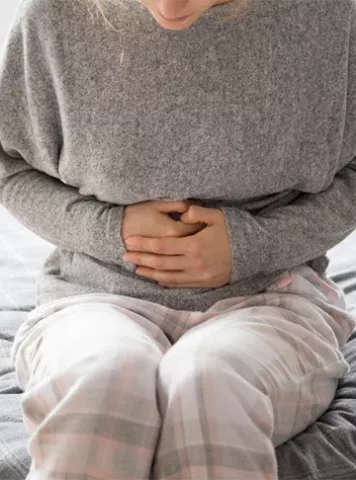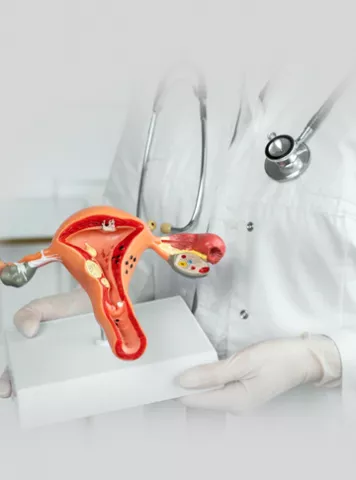PCOD Management
Polycystic Ovary Syndrome which is commonly known as PCOS or PCOD is a disorder which affects the amount of male hormone production in women. Androgen, the male hormone, is generally present in only minimal amounts. It is an endocrine system disorder which affects women who are in their reproductive years. Women who suffer from PCOD have several small, fluid-filled cysts on the surface of their ovaries. Most of the times, these cysts are harmless and non-fatal. They do, however, lead to severe hormonal imbalance in women of all ages. It is a condition wherein the production of Androgen, the male hormone, is increased than the normal amount. It is definitely difficult living with PCOD management.
Dr. Runu Kumar, Chief IVF And Infertility Specialist at Indira IVF Hospital, Explained PCOD management That: “Although this condition is incurable there are many things a person can do to keep it under control. The best way to deal with Polycystic Ovary Syndrome is to maintain a healthy lifestyle, follow a good exercise regime and keep yourself fit.” Women who suffer from this disorder face several issues such as irregular periods, diabetes, high cholesterol, low fertility, excessive hair growth, and acne. Menstrual problems such as abnormal menstruation, extremely heavy menstruation, irregular menstruation, spotting, and only light menstruation are also some of the problems faced by women suffering from PCOD. Having PCOD management that can insure your skin type to become oily and acne prone. Some other problems and symptoms that are faced by women are inappropriate male features, dark patches of skin, loss of scalp hair and sometimes even depression and anxiety.
Even though Polycystic Ovary Syndrome is incurable, there are ways in which the negative effects of this problem can be controlled. PCOS management is possible by following a healthy diet along with the medications prescribed by the doctors. Doctors prescribe birth control pills to women who suffer from irregular periods due to this syndrome. Metformin is given to patients who have a higher chance of developing diabetes or who already suffer from it. In the case of infertility or low fertility, hormones are given to the patient to increase the chances of a safe and healthy pregnancy. Supplements and hormones are also given to reduce excess hair growth and treat acne. Along with, lifestyle changes have to be made when suffering from PCOD.
Most of the women who suffer from PCOS don’t have the knowledge on how to manage PCOD. Women with the syndrome should eat healthily, manage their weight, be physically active and have control over their stress and anxiety levels. This will help them in maintaining hormone balance in their body and therefore, reduce any symptoms which are caused by the lack of such balance. Researchers have found that reducing even small amounts of weight and regular exercise has helped many women improve many symptoms such as irregular or heavy periods and low fertility. Studies have also shown that medicines work better when a woman eats healthy and maintains a proper and regulated lifestyle. Regulating what you eat and exercising every day can help you reduce the chances of heart diseases, diabetes, cholesterol and other major health risks. Depression and anxiety can also be controlled and cured by following a few simple regulations in the day to day life.
If you are overweight, reducing only about 5% – 7% of your total weight will help you fight many symptoms of PCOD management. Your body will be more receptive to insulin which in turn will reduce the risk of diabetes. This will also help in regulating your menstrual cycle, treating severe acne and reducing excess hair growth. Reducing your weight can reduce the amount of Androgen produced by your body. If you are planning a pregnancy, be sure to lose those extra kilograms to increase the chances of fertilization. After pregnancy, the baby will also require extensive care and monitoring for the first few days of his/her life. Multiple births have been known to be more complicated in the case of a PCOD management and pregnancy. Late pregnancies also have to carefully monitor to prevent any severe complications. According to a study conducted by Penn State University, women with PCOD who have lost 7% of their weight before starting any fertility treatment have shown greater fertility results.
Establishing a workout routine can do wonders for your body in terms of managing the symptoms of the disorder. Regular exercise along with a good diet plan will help you lead a normal life without many problems. This will also result in some healthy weight loss, which is an added benefit. The study by Penn State University also shows that people who have worked with their doctors to follow a diet with limited fat, low calories have shown much better progress in fighting the symptoms of the disorder.
You can begin with a brisk walk for 30 minutes or quick 15-20 minutes jog. This will help your body and your muscles get used to physical activity. After following this routine, you can tone it up a little and increase the walk to 45 minutes or 1 hour and the jog to 30 minutes or 45 minutes, according to your comfort. Along with this, walking after dinner is one of the most important steps to digest your dinner and speed up metabolism. The food you eat gets digested quickly. This step is crucial to control your blood sugar levels and cholesterol levels. When losing weight, it is important to focus on your abdominal area rather than your whole body because the problem is focused there. Riding bicycle for 30 minutes, 3 to 4 times a week can help you in losing the belly fat and increasing your metabolism substantially.
Just focusing on your diet will not get you the results you desire. A combination of a well-balanced diet and proper and intensive exercise is the only way to keep your body from the harmful effects of the disorder. Do not follow any diet blindly. Talk to your doctor about what your body needs and he will advise you to follow a Living With PCOD management made specifically for you according to the PCOD symptoms management. You may experience some symptoms that most women don’t, so following a diet which works for you is the first step to a healthy lifestyle. To begin with, you can focus on plant foods which include vegetables, fruits, nuts, etc. You can also add good fat, dairy with low-fat content, food which is rich in proteins to your diet for added benefits. These are the basic things that your doctor will insist you to eat. Anything other than this should only be recommended by a professional who deals with how to manage pcos.
Diet plans are only a part of the solution. Consist PCOD management sency is another half which requires willpower and a good support system. No diet plan would work until and unless it is followed religiously for a long period of time. The best way to be consistent in your diet is to take help from your family and friends. They can help you be on track with your diet and exercise.
Studies have shown that depression and anxiety are more common in women who suffer from PCOD. This can be attributed to the fact that hormonal imbalances affect your mental health and the struggles of suffering from the symptoms of PCOD. Women who suffer from this disorder should focus on relaxing their minds as well as their bodies. The best way to do this is to practice yoga on a daily basis. The effect that yoga has on people’s life is enormous. Daily yoga sessions, preferably in the morning, can help you relieve stress and bring in a positive start to your day. Besides yoga, there are other ways of relaxation. Taking deep breaths when feeling anxiety can be really helpful in stressful situations. A relaxed body can also help in reducing your blood glucose levels. Other activities such as reading and listening to soothing music can also help you calm your mind.
Living With PCOD Smoking and drinking alcohol should also be avoided. Both of these have negative effects on your health. When following a well-balanced diet, it is important to reduce the number of toxins taken in by our body. Smoking will not help in reducing your weight and would put extra stress on your body.
For anyone suffering from this syndrome, PCOD symptoms management is important to live a disease free life. Lifestyle interventions and changes are the only ways in which PCOD can be dealt with. Medicines are a secondary option in the case that lifestyle changes do not work but no medicine can perform to its full potential unless it is supported by proper diet, exercise, and a healthy lifestyle. Women who suffer from PCOD should focus on making their body healthy and fit to reduce any chance of developing severe diseases. A healthy lifestyle also includes proper sleep, time management, stress reduction. Knowledge plays an important role in treating the symptoms of PCOD. Anyone who suffers from PCOD should constantly update her knowledge on the topic and should have regular checkups to ensure a healthy future.
Articles
2022


Polycystic Ovarian Disease (PCOD): Causes, Symptoms and Treatment
PCOD Polycystic ovary disease (PCOD) is the number of symptoms on account o...
2022


PCOD Pregnancy - Getting Pregnant with PCOD
The full form of PCOD is Polycystic Ovarian Disease. This is also known as Pol...
2022


Common Myths About PCOD Busted
PCOD, Polycystic ovarian syndrome disease or polycystic ovarian syndrome is a ...


पीसीओडी (Pcod Kya Hota Hai) के कारण, लक्षण और उपचार
पीसीओडी क्या हैं (PCOD Meaning in Hindi) PCOD k...
Pregnancy Calculator Tools for Confident and Stress-Free Pregnancy Planning
Get quick understanding of your fertility cycle and accordingly make a schedule to track it

















